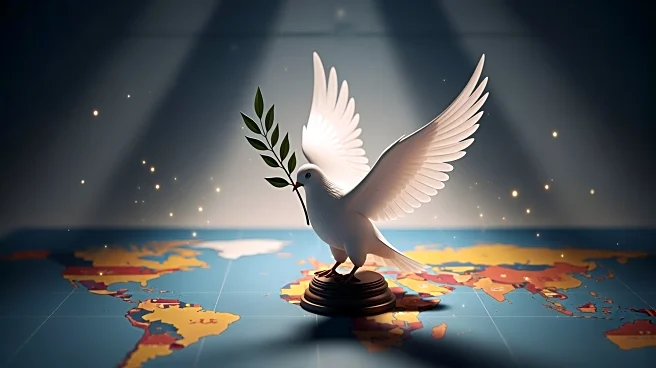What's Happening?
Sudan has been embroiled in a devastating conflict for over two years, with its military and the paramilitary Rapid Support Forces (RSF) vying for control. The war has resulted in significant atrocities
and a humanitarian crisis, with reports of mass killings and rapes. The RSF recently seized the city of el-Fasher in Darfur, exacerbating the situation. International involvement has been a critical factor, with the United Arab Emirates accused of supplying weapons to the RSF, despite its denial. Egypt is alleged to support the Sudanese military. The U.S. has formed a mediating group, the Quartet, including Egypt, the UAE, and Saudi Arabia, to propose a peace plan involving a humanitarian truce and a political process.
Why It's Important?
The ongoing conflict in Sudan has severe implications for regional stability and international relations. The involvement of external powers like the UAE and Egypt highlights the geopolitical interests at play, with the UAE aiming to counter Islamist groups and expand its influence. The humanitarian crisis, marked by widespread atrocities, demands urgent international attention and intervention. The U.S. mediating efforts are crucial in attempting to halt the violence and initiate a political resolution. The conflict affects global stakeholders, including aid organizations and countries with strategic interests in the region, emphasizing the need for a coordinated international response.
What's Next?
The proposed peace plan by the Quartet calls for a three-month humanitarian truce, followed by a nine-month political process. The RSF has agreed to the truce, but the Sudanese military demands the RSF's withdrawal from civilian areas and disarmament. The U.S. continues to work with both sides to finalize the truce, although direct negotiations have stalled. The focus may shift to persuading external powers to cease support for the warring factions, as their involvement has been a significant barrier to peace. The U.S. is positioned to lead these diplomatic efforts, given its influence and strategic interests in the region.
Beyond the Headlines
The conflict in Sudan underscores the complex interplay of regional power dynamics and the role of paramilitary forces in shaping geopolitical landscapes. The UAE's support for the RSF reflects broader imperial ambitions and a strategy to counter Islamist influence. The situation raises ethical questions about international arms sales and the responsibility of global powers in fueling conflicts. Long-term implications include potential shifts in regional alliances and the need for robust international frameworks to address such crises. The humanitarian impact remains a pressing concern, with millions affected by violence and displacement.










